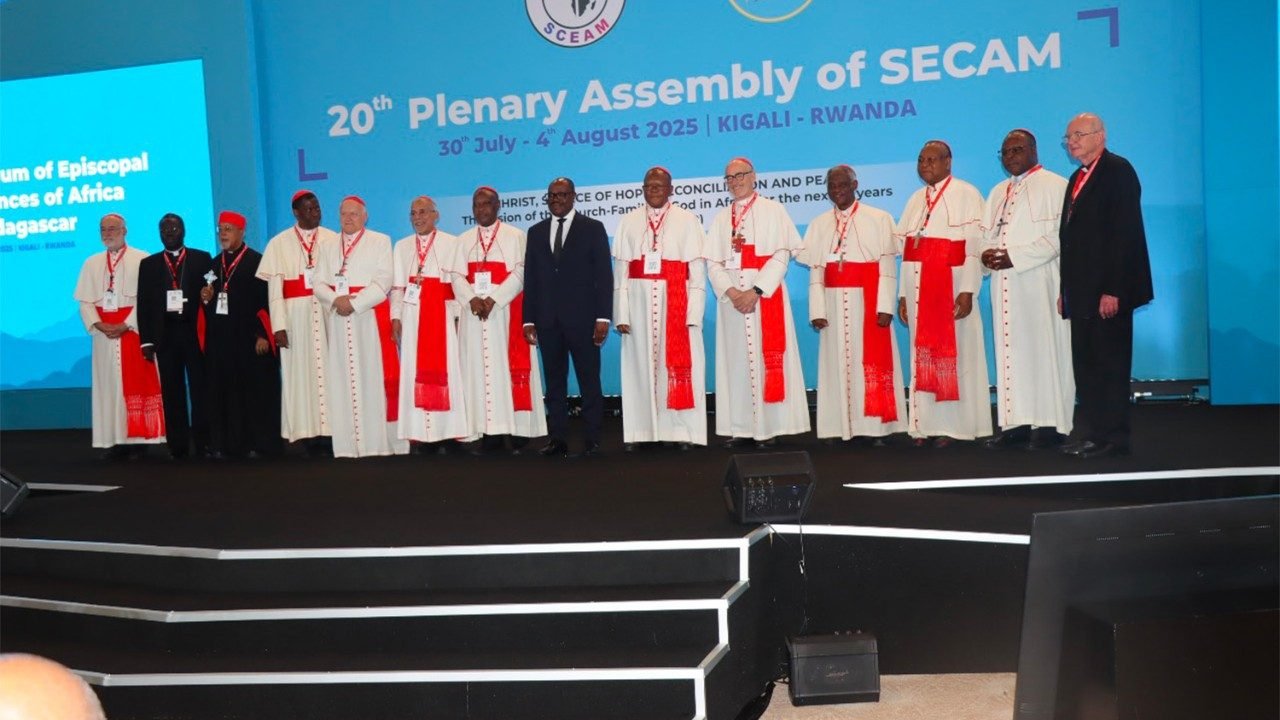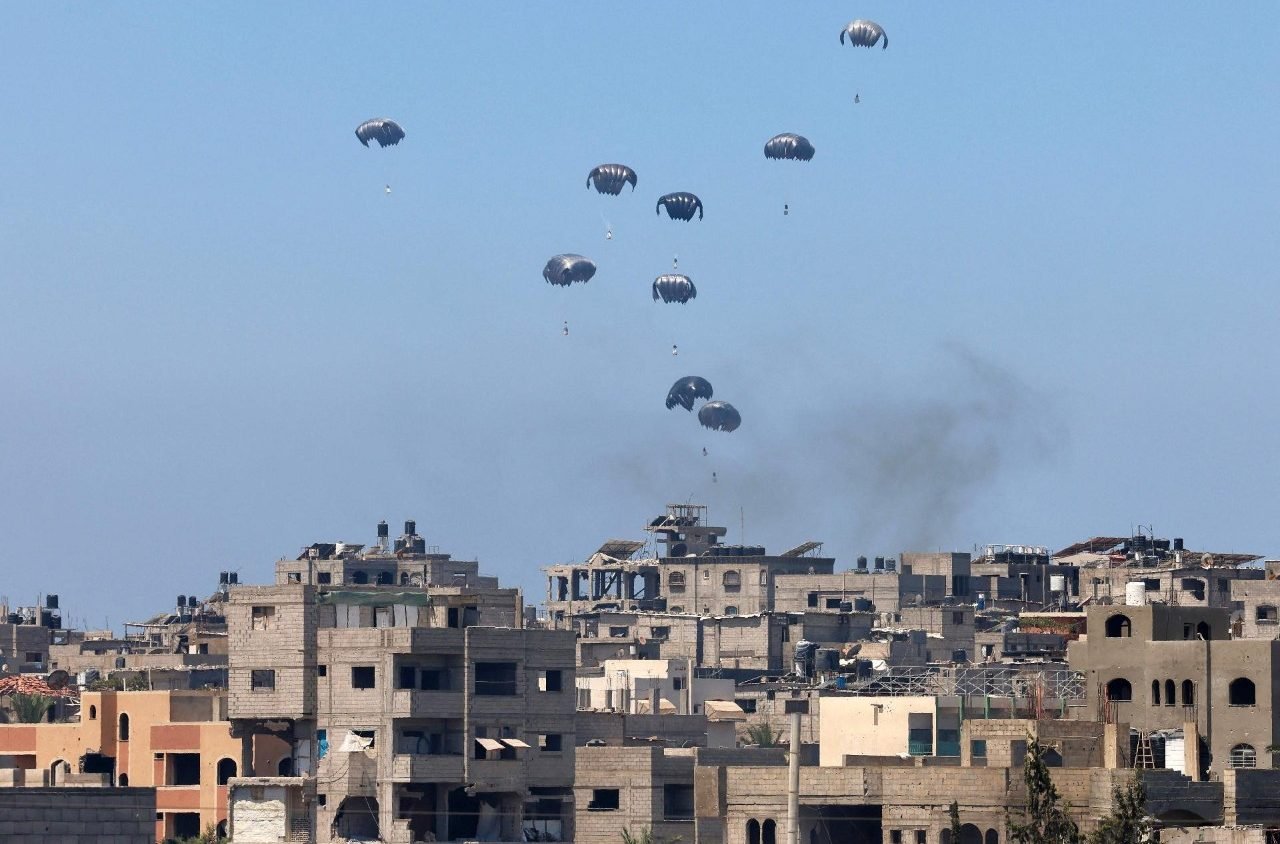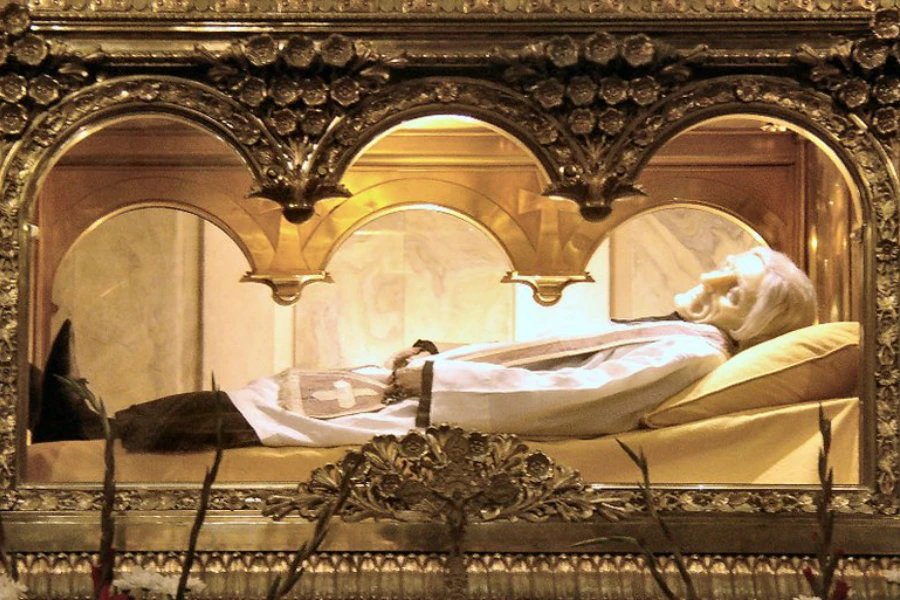
The 20th SECAM Plenary Assembly, held in Kigali, Rwanda, concluded on Sunday at the Marian Shrine of Our Lady of Kibeho. The newly re-elected President of SECAM, Cardinal Fridolin Ambongo, Archbishop of Kinshasa, assured pilgrims that Africa has every reason to be optimistic about its future. He emphasised that this future lies in the hands of young people, who continue to embrace the faith.
By Paul Samasumo in Kigali
The lush, mountainous village of Kibeho is renowned as the site where the Blessed Virgin Mary appeared in the 1980s to adolescents Alphonsine Mumureke, Nathalie Mukamazimpaka, and Marie Claire Mukangango. This Sunday, Kibeho was alive with Marian pomp and festivities, marked by a lively choir, children’s liturgical dancing. It was a convivial atmosphere stamped by the presence of many young pilgrims. In total, approximately 25,000 people gathered.
Young people consecrated to the Virgin Mary
According to Fr. Fidele Mutabazi, Managing Director of the Church’s Kinyamateka Newspaper and Director of Communications for the Episcopal Conference of Rwanda, about 20,000 of the pilgrims attending the SECAM Mass were young people from all dioceses of Rwanda and parts of the Democratic Republic of Congo. They had gathered in Kibeho to celebrate the 2025 Jubilee of Young People. The Rwanda jubilee was organized to coincide with the global Jubilee for Young People, held in Rome this weekend.
Towards the end of the Mass, the young people of Rwanda and the DRC were consecrated to the Blessed Virgin Mary by Cardinal Ambongo and the SECAM Bishops, who extended their hands and gave them a solemn blessing and commissioning.
In his homily, Cardinal Ambongo called upon the youth to emulate a young man from the DRC who died for his faith. The Cardinal presented the newly beatified Blessed Floribert Bwana Chui, who was martyred in 2007 at the age of 26 for resisting corruption and dying in hatred of his faith. The young people were encouraged by Cardinal Ambongo to emulate Blessed Floribert’s courage.
Africa has every reason to be optimistic
Addressing the SECAM Bishops and the wider congregation, Cardinal Ambongo urged them never to lose hope, even amid the many difficulties facing the African continent.
“Fearlessly, united hand in hand with God and with one another, let us go forward; we are disciples of Christ. Christ goes before us,” he said. He added, “Brothers and Sisters, with all the faithful of our continent, regardless of current difficulties, let us hold hands to build our Africa of the future, founded on Christ. ‘For our present history is not closed in on itself, but it is open to the Kingdom of God. Therefore, despair and pessimism cannot be justified regarding Africa’s future.’ Christ, our hope, is alive; we will live. Let us all rise together to build the Africa of hope.”
Rwanda’s Minister of Local Government, Dominic Habimana, was also present at the Kibeho Eucharistic celebration. He addressed the pilgrims and thanked the Bishops for choosing Rwanda as the host for their plenary assembly.
The SECAM Bishops released a final communiqué at the end of the plenary. In their message, they propose a continental pastoral vision for the next 25 years—one rooted in Christ as the source of hope.
Below is the full final message of SECAM.
Message of the 20th Plenary Assembly of the Symposium of Episcopal Conferences of Africa and Madagascar (SECAM)
Gathered in Kigali, Rwanda, from 30 July to 4 August 2025, the 20th Plenary Assembly of the Symposium of Episcopal Conferences of Africa and Madagascar (SECAM) focused on the theme: “Christ, Source of Hope, Reconciliation and Peace: The Vision of the Church-Family of God in Africa for the Next 25 Years (2025–2050).”
Following addresses by speakers from Africa and beyond, and fruitful deliberations, we, Cardinals, Archbishops, and Bishops, members of SECAM, address this message to the Church, the Family of God in Africa and its Islands, as well as to all people of goodwill.
In our Final Message of the 19th Plenary Assembly, held in Accra, Ghana, from 25 July to 1 August 2022, we recalled “the great insecurity reigning in several regions of our continent, due to socio-political instability, violence, economic poverty, weak health structures, insurgency, terrorism, the exploitation of religion for political purposes, and the lack of respect for the environment and good governance.” These challenges persist and remain to be fully overcome, but they should not be a reason to fall into despair. For with Christ and through Him, an essential virtue can fill our hearts and allow us to look toward the future with confidence and hope. Christ is the Source of hope for Africa and its peoples.
1. Hope at the Heart of Our Lives
Before returning to the Father’s house, Pope Francis set the whole Church on the path of synodality. It is within this framework that our meeting this year takes place, bearing witness to our collective reflection on how we walk together over the next 25 years. As we know, synod means “walking together.” But we can only walk together if we share a common goal. Our goal is to make Christ ever more present in our communities and in our lives. Christ is the ultimate purpose of our synodal journey; He is the foundation of our hope and the reason we carry our cross in His footsteps. He is our hope and the way (John 14:6) that leads us to the fullness of truth and abundant life (John 10:10).
Christian hope is rooted in the primacy of the Kingdom of God. It is a promise of God’s reign among people of goodwill. This entails a life of faith and obedience to God; a God who provides for the needs of all who trust in Him: “Seek first the Kingdom of God and His righteousness, and all these things will be given to you as well” (Mt. 6:33).
We exhort all Christians in Africa and its Islands to open their hearts to this hope that Christ, the “Resurrection and the Life in abundance,” offers, so they may be freed from all forms of death that confront them in daily life. It is timely to recall the prophetic words of Saint Pope John Paul II at his inauguration in Saint Peter’s Square on 22 October 1978:
“Do not be afraid! Open wide the doors for Christ and His saving power. Open the boundaries of States, political and economic systems, as well as the vast fields of culture, development, and civilization. Do not be afraid!”
The challenge of being the “architects of the Africa we want” ultimately involves opening up the horizons of hope, so that we may grow into our full humanity as children of God, called to the newness of the Gospel that sets us free from all evil (cf. Instrumentum Laboris, October 2023).
Christian hope is not to be confused with a mere mental projection detached from reality. It is an active commitment, a presence in the name of the Lord Jesus, alongside those who suffer, who endure injustice, and who are cast aside by the powerful of this world. Following Christ, the Church in Africa and Madagascar must embrace the preferential option for the poor, as taught by her Master. “Proclaim the word; be persistent whether it is convenient or inconvenient” (2 Tim 4:2), following the example of Saint Paul, calls for bold words that challenge and disrupt the status quo. Saint John Paul II even stated that “a sign of contradiction” could be “a distinctive definition of Christ and His Church.”
“I am sending you out like sheep among wolves” (Mt. 10:16), Jesus warned His disciples, yet He immediately added this reassuring promise: “And behold, I am with you always, until the end of the age” (Mt. 28:20).
Therefore, despite the difficulties of the mission, the presence of Jesus remains a source of hope for “a Church that goes forth,” as Pope Francis says; a Church made up of Christians actively building a new world, a new heaven, and a new earth that has been promised to us. These are Christians who transform humanity into the Family of God and work to make it inhabit the Kingdom of God.
On June 15, a young Congolese layman, Floribert Bwana Chui, was beatified in Rome. He was assassinated in 2007 in Goma for refusing to allow spoiled food products to enter the country in exchange for a bribe. Pope Francis paid tribute to this young man, recognized as a “martyr of honesty and moral integrity.” We encourage our African youth to bear witness to Gospel values.
The Kampala Document called for the creation of a new Africa: “An Africa of the baptized who are conscious that their vocation, intrinsically linked to their identity, is to cling to the person of Jesus Christ, to remain in Him, to be transformed by the Holy Spirit in the love of the Father, and to work so that the reign of God may spread more deeply within the heart of African societies” (no. 131).
2. Christ, Source of Reconciliation and Peace
Interethnic and interstate tensions in various African regions result only in human impoverishment, which in turn triggers further deprivation that paralyzes the entire continent. No one truly wins in a conflict, whatever its nature. Reconciliation, forgiveness, and peace are essential elements for the development of all dimensions of human life. As Saint Paul insists: “We implore you on behalf of Christ, be reconciled to God. For our sake, He made Him to be sin who knew no sin, so that in Him we might become the righteousness of God” (2 Cor 5:20-21).
Reconciliation between people, and even more so between Christians, must find its foundation in God’s reconciliation with all humanity through the Lord Jesus.
We, your Pastors, believe that our mission, in the name of the Lord Jesus Christ, is to call all baptized persons in conflict to reconciliation and forgiveness, so that the harmony and peaceful coexistence established by Christ’s salvific act may become a lifestyle for all.
Reconciliation and peace are indeed “a path of hope” in that they reveal the true nature of the human person as intrinsically oriented toward others. The proclamation of this message of hope is all the more urgent in light of the continued reality, tragically, where “so many men and women, children and the elderly, are denied their dignity, their physical integrity, their freedom, including religious freedom, deprived of community solidarity and of hope for the future. Countless innocent victims bear the burden of humiliation and exclusion, of bereavement and injustice, and even the trauma of systematic persecution directed against their people and loved ones.”[1]
Peace among the sons and daughters of the Church in Africa and the Islands, baptized in Christ, must be uncompromising and unconditional. It must be rooted in the gratuitous gift of God given through Christ by the Holy Spirit. “Peace I leave with you; my peace I give to you. I do not give to you as the world gives,” said Jesus (John 14:27). It is in this spirit that Pope Leo XIV, on the day of his election, solemnly declared: “It is the peace of the Risen Christ, disarming, humble, and persevering. It comes from God, who loves us all unconditionally.”
The Church, as a witness to the suffering of peoples in areas plagued by armed conflict, must commit itself more vigorously to awareness-raising and concrete action for peace. Educating the younger generations in the ways of peace must be among her priorities, so that every man and woman of Africa and Madagascar may become a channel of God’s peace in Christ Jesus.
We seize this opportunity to appeal to all our political leaders to have at heart the wellbeing of the peoples they govern, to protect the weakest, and to promote dialogue and a better way of living together.
Saint Pope Paul VI, in his encyclical Populorum Progressio (1967), launched a message that remains highly relevant to our continent today: “Development is the new name for peace.” In other words, peace is a sine qua non for the emergence of a healthy environment—one that alone can ensure the foundational elements of social and economic progress. However, this peace, which opens the way to development, can only be true if it is rooted in its Source, who is Christ. In the words of Saint Paul, and with firm conviction in our prophetic mission, we never cease to wish for our continent: “Peace be to the brothers, and love with faith, from God the Father and the Lord Jesus Christ” (Eph. 6:23).
3. Walking Together as the Church-Family of God
The message that SECAM seeks to place in the hearts of the sons and daughters of Africa and Madagascar at this 20th Plenary Assembly carries a twofold dimension: first, to rekindle and live out our true identity as the Church-Family of God; God as our Father, the Church as our Mother, and others as our brothers and sisters; second, to fully embrace the great mission of reconciliation.
Because we are human and often wound one another, we constantly need to heal and restore our relationships. Reconciliation, whose source is Christ, enables us to mend broken bonds. Through this healing, we are called to live in justice and peace. This is the mission entrusted to us by the Second Special Assembly for Africa of the Synod of Bishops:
“The face of evangelization today takes the name of reconciliation, an indispensable condition for establishing relationships of justice among people in Africa and for building a just and lasting peace that respects each person and all peoples. It is a peace open to the contributions of all people of goodwill, beyond religious, ethnic, linguistic, cultural, and social affiliations.” (Africae Munus, no. 174)
To walk and live as the Church-Family of God means to be in right relationship with God and with one another. It means recognizing God as our Father, the Church as our Mother, and ourselves as brothers and sisters. This image calls us to a life of communion, love, and mutual responsibility.
Today, Christ sends us forth on mission: to renew our understanding and practice of being a Family of God, and to serve our communities and our continent with the Gospel of reconciliation, justice, and peace.
In the Kampala Document of 2019, we expressed a similar vision: “The Church is a family of people united by life, mutual acceptance, love, commitment, celebration of faith, forgiveness, joy, and sharing. It is a community for building justice, peace, solidarity, and fraternity, lived out in word and deed.” Understood in this way, the Church-Family of God becomes a true cradle for the birth and growth of hope, reconciliation, and peace.
Conclusion
In this Jubilee Year, we recall that the fundamental mission of all the baptized is to be messengers and builders of hope.
Thus, the Church-Family of God in Africa and its Islands proposes a vision for the next 25 years, a vision rooted in Christ our Hope and structured around twelve pillars:
1. Evangelization (Catholic Education and theological tradition)
2. A self-reliant Church
3. Family model of leadership
4. Formation on missionary discipleship and synodality.
5. Care of creation
6. The youth and the renewal of the Church
7. Justice, Peace and Integral human development
8. Ecumenism and interfaith dialogue
9. Mission in the digital environment
10. the health of the people of God
11. Liturgical life of the African Church
12. Church and Politic
May the Virgin Mary, Our Lady of Africa, accompany the Church on our continent, so that she may bear witness to Jesus, our Peace and our Hope.
[1] Pope Francis, Peace, a Journey of Hope: Dialogue, Reconciliation and Ecological Conversion – January 1, 2020, 53rd World Day of Peace.




